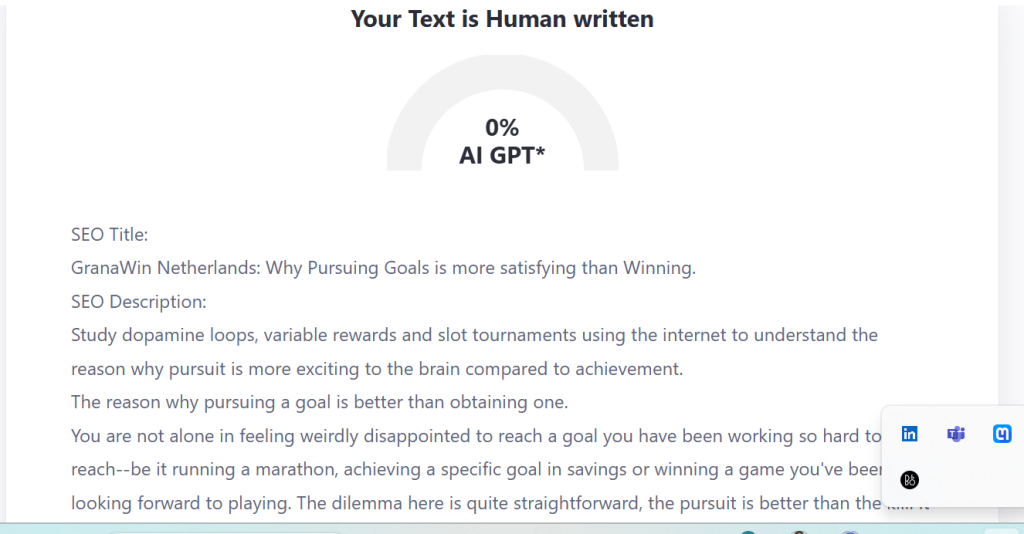Why Chasing a Goal Feels Better Than Achieving It

You are not alone in feeling weirdly disappointed to reach a goal you have been working so hard to reach–be it running a marathon, achieving a specific goal in savings or winning a game you’ve been looking forward to playing. The dilemma here is quite straightforward: the pursuit is better than the kill. It is not idleness or thankfulness. That is the way the human brain is wired.
The Thrill of the Chase: What makes the Journey So Interesting.
When you have something to achieve in mind, your brain switches. Anticipation causes a rapid flow of dopamine in your system —the chemical that motivates you to continue moving forward. This is the dopamine loop at work: you are not actually being rewarded to possess something, but evoking that direction.
This reward forecast is referred to as such by psychologists. The nearer the better the high. But once the goal is achieved? That dopamine wave crashes. The aha moment is only several seconds long; then your mind begins to inquire, ‘What next?’
This is also the reason why accomplishments are, in most cases, flat. Hedonic adaptation comes in–you almost instantly become accustomed to the new status quo. The prize that appears to be life-altering is dusted off, the advancement becomes a simple task, and the lottery is fulfilling until the next roll.
Motivational neuroscience and Rewarding neuroscience.
Let’s get under the hood. Dopamine does not have much to do with pleasure, but with wanting. The reward systems within the brain (particularly, the nucleus accumbent) are activated when there is uncertainty, challenge or anticipation. This is why we are more alive following something than sitting in front of it.
It also features an ingenious method for predicting error. When the result exceeds expectations, there is a surge of dopamine. Worse still, the system dries. That system makes us always strive for perfection in the way we act, pursue changeable rewards, and we seldom feel complete.
This is why chase bias exists; we become addicted to it because the brain excels at chasing, not at achieving the final results.
The Online Parallel: Objectives in the Online World.
Go through your phone, and you will find the same psychological patterns all around. Mini-challenges, such as progress bars, streaks, and levels, are what digital engagement thrives on. Places know that individuals enjoy being just shy of being there, rather than being there.
Plug and play slot tournaments online, say. The actual fun can be in the hype: the ascent to a higher position, monitoring competitors’ performance, and narrowly missing close hits. It does not matter whether you win or not, but the fact that you are running is the rush.
It is not a bug in human psychology. It’s a feature. The brain is preprogrammed to run, and computer systems have been trained to indulge in thatality.
Goal Study: GranaWin Netherlands and the Goal-Chasing Mechanism.
One example of this is the way platforms like GranaWin Netherlands create their experiences. It is not only the structure of winning, but also the phases of the play, the small steps, and the feeling of progress.
Leaderboards, challenges, progression bars, and so on are all designed to create a sense of being almost there. This is directly related to our behavioural habits — how uncertainty and anticipation motivate us. The action is designed in such a way that it becomes, perhaps more so, as interesting as the reward.
What is interesting is how this closely resembles life in the real world. It is the pauses between that make the greatest engagement, whether you are training to run a 10K, your phone app is pinging, or you are playing in a digital tournament.
Professional Interpretations of the Goal at vs. Achievement Paradox.
It has long been noted by behavioural scientists that instant gratification goes down like lead, but delayed gratification with small wins keeps us addicted. The chase taps into psychological traps, such as the near-miss effect — being almost as satisfying as winning.
According to neuroscientists, the seeking system in the brain is programmed in such a way that it prompts us to continue moving, rather than sitting stagnant with our rewards. This was evolutionarily a natural thing to do: to survive, you had to chase, not eat.
According to industry observers, this wiring is borrowed by digital platforms, such as a gaming ecosystem or a productivity app. It is not the mechanics of the jackpot, but of making infinite micro-goals to lure people into a chase. It is not so much about the prize, but the advance.

![HITV APP Download [Apk] Latest Version [Unlimited Movies]](https://hitvofficial.com/wp-content/uploads/2024/06/cropped-HiTV-Official-3.png)